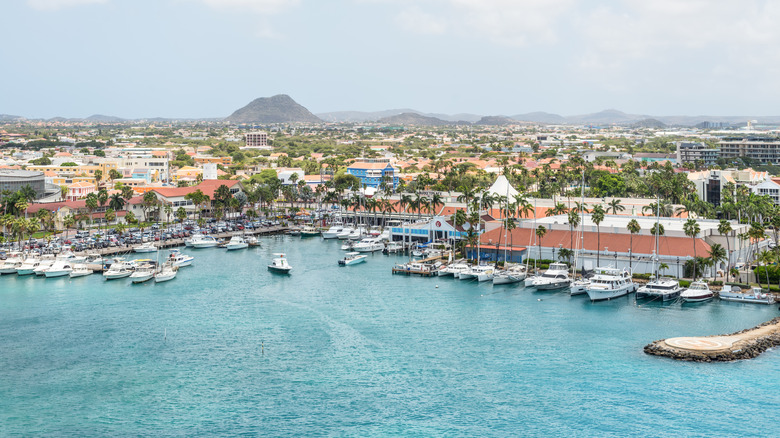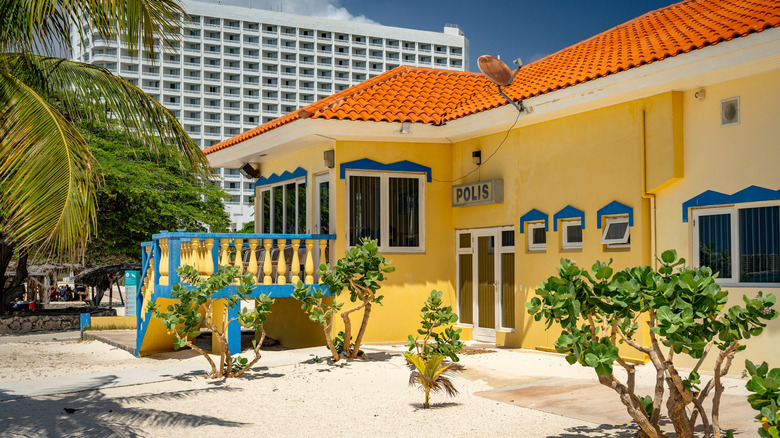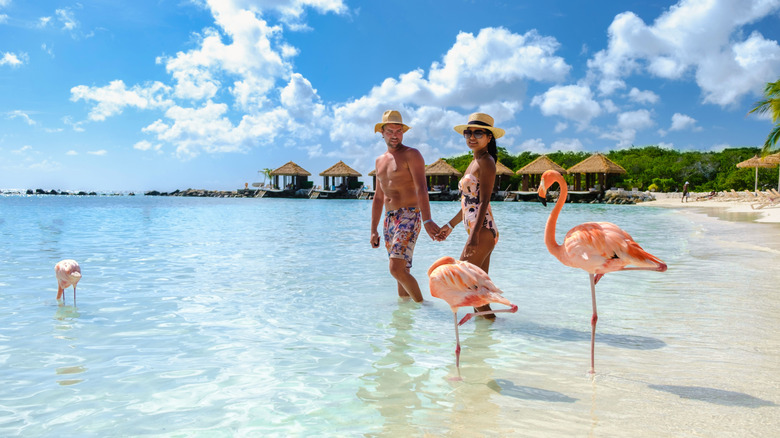One Of The Caribbean's Safest Islands Is Also One Of The Best Retirement Destinations In The Region
The only thing better than vacationing in paradise? Living in paradise, of course, which is well within reach for sun-seeking retirees looking to settle down on the peaceful, stunning island of Aruba. A Caribbean oasis celebrated for its glistening turquoise coastline and pristine, powdery beaches, Aruba offers retirees a perfect sunny climate year-round, modern infrastructure and amenities, great healthcare, and an unfussy retiree visa program. With all this and more going for the lush island that's actually a constituent country of the Kingdom of the Netherlands, it's easy to see how Aruba shines as one of the best retirement destinations in the region.
Situated off the northern coast of Venezuela in the Caribbean Sea, Aruba is the "A" in the Caribbean's pristine ABC Islands, which also include Bonaire and Curacao. Aruba joins these neighboring isles in sitting well below the hurricane belt, making it one of the safest Caribbean islands to visit during hurricane season, which typically peaks between June and November. Aruba's incredible natural beauty, tranquil location, and practically non-existent rainfall have helped earn it the moniker "one happy island." The island's 108,000 residents are impressively diverse, representing over 90 nationalities. Aruba's official languages are Dutch and Papiamento, and North American retirees will be happy to learn that English and Spanish are widely spoken.
Getting to Aruba is easy, with direct flights from major U.S. cities landing regularly at Queen Beatrix International Airport. Once you arrive in Aruba, get ready to slip into easygoing island life among the tight-knit expat community, many of whom live in the vibrant Noord neighborhood, which is conveniently close to shops and some of the island's best beaches
Enjoy peace of mind retiring on the Caribbean's safest island
According to the Caribbean Island Safety Index 2025 published by travel agency Always All Inclusive, Aruba is the safest island in the Caribbean. The study arrived at this conclusion by scouring data from a multitude of sources, including U.S. State Department travel advisories, reported violent crime rates, hurricane statistics, and healthcare information. When all was said and done, Aruba sailed into first place for several compelling reasons, one being that it lacks hurricanes. On average, Aruba suffers a hurricane just every 28.8 years, and these generally tend to breeze by the north side of the island. Aruba hasn't seen a hurricane since Hurricane Felix passed through in 2007. Even then, the damage was minimal.
As for crime stats, Aruba has U.S. State Department Level 1 Advisory, the lowest level alerting travelers to "exercise normal caution." To put this into context, Australia, Canada, New Zealand, and Portugal are also level 1 countries. Of course, crime happens in Aruba, but rates are incredibly low. Aruba's homicide rate is 2 per 100,000 people, compared to 40 per 100,000 on fellow Caribbean island Jamaica. While crimes like pickpocketing, shoplifting, scams, and auto theft are more common, rest assured that Aruba's expertly trained, English-speaking police force is omnipresent.
Another standout safety factor is Aruba's excellent Dutch standard of healthcare, a life-altering detail that requires careful consideration when you're planning to retire in the Caribbean. The island's two hospitals, Dr. Horacio Oduber Hospital and ImSan Medical Institute, boast state-of-the-art equipment and are prepared to handle numerous situations and ailments. Emergency treatment on the small island can be trickier, so both hospitals are equipped with helicopters to airlift patients to nearby Curaćao, another Dutch island. For medications and first aid needs, you'll find pharmacies all over the island.
Safety, modern amenities & infrastructure, and a straightforward visa program make Aruba a top retirement destination
Along with Aruba's exceptional safety, retirees can enjoy laid-back living with the same modern "first world" infrastructure and amenities they have back home. Roads are well-paved with signage in Dutch and English, while public transportation on the island's Arubus is comfy, timely and safe. WiFi is reliable, and mobile carriers like Verizon, T-Mobile, and AT&T all operate on the island. Food hygiene standards are equivalent to the U.S., and Aruba has one of the world's most advanced water distillation plants. The island's vibrant capital, Oranjestad, is home to delicious dining, tempting shopping centers, and plenty of entertainment.
The drawbacks of retiring in Aruba? The cost of living tends to be high since island life means paying a premium for imported goods. Also, many shops and restaurants catering to tourists drive up prices. Options for essentials like appliances, furnishings, food, and vehicles might be limited since there's only so much space to carry items on a small, isolated island. Another con is that residents are taxed on their worldwide income, so if you still draw a salary anywhere in the world, it's important to consult a tax professional.
If you weigh the pros and cons and decide Aruba is for you, a straightforward visa program offers a smooth transition to living in paradise. Those 55 and older can qualify for residency in Aruba with a minimum income of $56,200, which can come from either a pension or a source of income. Retirees must own a home in Aruba or be in contract under a long-term lease. Aruba also requires retirees to have comprehensive health insurance. Once your visa and property purchase are set, say hello to breezy stress-free days filled with outdoor activities like bicycling, golfing, sailing, and kayaking, along with soaking in Aruba's world-famous beaches and incredible biodiversity.


